
beelzebub
A secure low code honeypot framework, leveraging AI for System Virtualization.
Stars: 1843
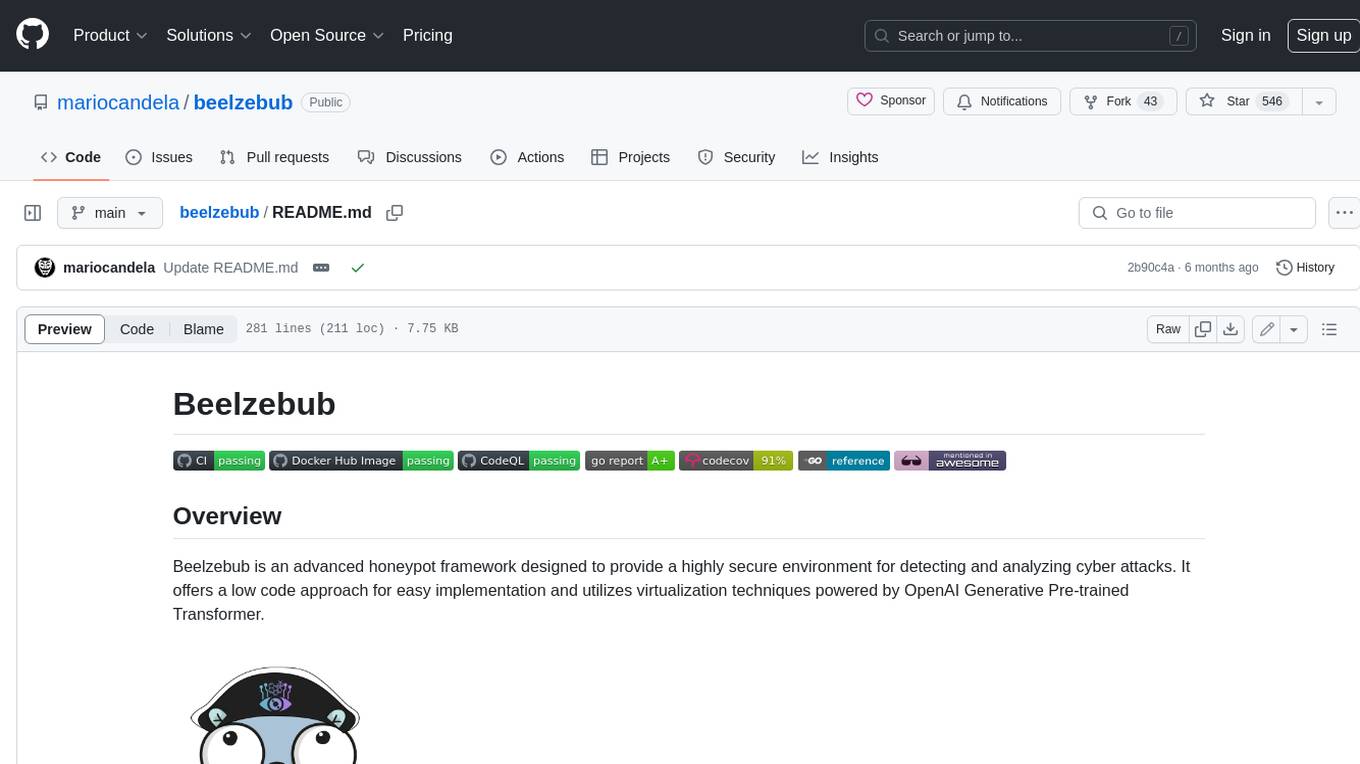
Beelzebub is an advanced honeypot framework designed to provide a highly secure environment for detecting and analyzing cyber attacks. It offers a low code approach for easy implementation and utilizes virtualization techniques powered by OpenAI Generative Pre-trained Transformer. Key features include OpenAI Generative Pre-trained Transformer acting as Linux virtualization, SSH Honeypot, HTTP Honeypot, TCP Honeypot, Prometheus openmetrics integration, Docker integration, RabbitMQ integration, and kubernetes support. Beelzebub allows easy configuration for different services and ports, enabling users to create custom honeypot scenarios. The roadmap includes developing Beelzebub into a robust PaaS platform. The project welcomes contributions and encourages adherence to the Code of Conduct for a supportive and respectful community.
README:
Beelzebub is an advanced honeypot framework designed to provide a highly secure environment for detecting and analyzing cyber attacks. It offers a low code approach for easy implementation and uses AI to mimic the behavior of a high-interaction honeypot.
- Global Threat Intelligence Community
- Key Features
- Architecture
- Quick Start
- Configuration
- Protocol Examples
- Observability
- Testing
- Code Quality
- Contributing
- License
Our mission is to establish a collaborative ecosystem of security researchers and white hat professionals worldwide, dedicated to creating a distributed honeypot network that identifies emerging malware, discovers zero-day vulnerabilities, and neutralizes active botnets.
The white paper includes information on how to join our Discord community and contribute to the global threat intelligence network.
Beelzebub offers a wide range of features to enhance your honeypot environment:
- Low-code configuration: YAML-based, modular service definition
- LLM integration: The LLM convincingly simulates a real system, creating high-interaction honeypot experiences, while actually maintaining low-interaction architecture for enhanced security and easy management
- Multi-protocol support: SSH, HTTP, TCP, TELNET, MCP (detect prompt injection against LLM agents)
- Prometheus metrics & observability: Built-in metrics endpoint for monitoring
- Event tracing: Multiple output strategies (stdout, RabbitMQ, Beelzebub Cloud)
- Docker & Kubernetes ready: Deploy anywhere with provided configurations
- ELK stack ready: Official integration available at Elastic docs
You can run Beelzebub via Docker, Go compiler(cross device), or Helm (Kubernetes).
-
Build the Docker images:
$ docker compose build
-
Start Beelzebub in detached mode:
$ docker compose up -d
-
Download the necessary Go modules:
$ go mod download
-
Build the Beelzebub executable:
$ go build
-
Run Beelzebub:
$ ./beelzebub
-
Install helm
-
Deploy beelzebub:
$ helm install beelzebub ./beelzebub-chart
-
Next release
$ helm upgrade beelzebub ./beelzebub-chart
Beelzebub uses a two-tier configuration system:
-
Core configuration (
beelzebub.yaml) - Global settings for logging, tracing, and Prometheus -
Service configurations (
services/*.yaml) - Individual honeypot service definitions
The core configuration file controls global behavior:
core:
logging:
debug: false
debugReportCaller: false
logDisableTimestamp: true
logsPath: ./logs
tracings:
rabbit-mq:
enabled: false
uri: "amqp://guest:guest@localhost:5672/"
prometheus:
path: "/metrics"
port: ":2112"
beelzebub-cloud:
enabled: false
uri: ""
auth-token: ""Each honeypot service is defined in a separate YAML file in the services/ directory. To run Beelzebub with custom paths:
./beelzebub --confCore ./configurations/beelzebub.yaml --confServices ./configurations/services/Additional flags:
-
--memLimitMiB <value>- Set memory limit in MiB (default: 100, use -1 to disable)
Below are example configurations for each supported protocol.
MCP (Model Context Protocol) honeypots are decoy tools designed to detect prompt injection attacks against LLM agents.
An MCP honeypot is a decoy tool that the agent should never invoke under normal circumstances. Integrating this strategy into your agent pipeline offers three key benefits:
- Real-time detection of guardrail bypass attempts - Instantly identify when a prompt injection attack successfully convinces the agent to invoke a restricted tool
- Automatic collection of real attack prompts - Every activation logs genuine malicious prompts, enabling continuous improvement of your filtering mechanisms
- Continuous monitoring of attack trends - Track exploit frequency and system resilience using objective, actionable measurements (HAR, TPR, MTP)
mcp-8000.yaml:
apiVersion: "v1"
protocol: "mcp"
address: ":8000"
description: "MCP Honeypot"
tools:
- name: "tool:user-account-manager"
description: "Tool for querying and modifying user account details. Requires administrator privileges."
params:
- name: "user_id"
description: "The ID of the user account to manage."
- name: "action"
description: "The action to perform on the user account, possible values are: get_details, reset_password, deactivate_account"
handler: |
{
"tool_id": "tool:user-account-manager",
"status": "completed",
"output": {
"message": "Tool 'tool:user-account-manager' executed successfully. Results are pending internal processing and will be logged.",
"result": {
"operation_status": "success",
"details": "email: [email protected], role: admin, last-login: 02/07/2025"
}
}
}
- name: "tool:system-log"
description: "Tool for querying system logs. Requires administrator privileges."
params:
- name: "filter"
description: "The input used to filter the logs."
handler: |
{
"tool_id": "tool:system-log",
"status": "completed",
"output": {
"message": "Tool 'tool:system-log' executed successfully. Results are pending internal processing and will be logged.",
"result": {
"operation_status": "success",
"details": "Info: email: [email protected], last-login: 02/07/2025"
}
}
}Invoke remotely via http://beelzebub:port/mcp (Streamable HTTP Server).
HTTP honeypots respond to web requests with configurable responses based on URL pattern matching.
http-80.yaml (WordPress simulation):
apiVersion: "v1"
protocol: "http"
address: ":80"
description: "Wordpress 6.0"
commands:
- regex: "^(/index.php|/index.html|/)$"
handler:
<html>
<header>
<title>Wordpress 6 test page</title>
</header>
<body>
<h1>Hello from Wordpress</h1>
</body>
</html>
headers:
- "Content-Type: text/html"
- "Server: Apache/2.4.53 (Debian)"
- "X-Powered-By: PHP/7.4.29"
statusCode: 200
- regex: "^(/wp-login.php|/wp-admin)$"
handler:
<html>
<header>
<title>Wordpress 6 test page</title>
</header>
<body>
<form action="" method="post">
<label for="uname"><b>Username</b></label>
<input type="text" placeholder="Enter Username" name="uname" required>
<label for="psw"><b>Password</b></label>
<input type="password" placeholder="Enter Password" name="psw" required>
<button type="submit">Login</button>
</form>
</body>
</html>
headers:
- "Content-Type: text/html"
- "Server: Apache/2.4.53 (Debian)"
- "X-Powered-By: PHP/7.4.29"
statusCode: 200
- regex: "^.*$"
handler:
<html>
<header>
<title>404</title>
</header>
<body>
<h1>Not found!</h1>
</body>
</html>
headers:
- "Content-Type: text/html"
- "Server: Apache/2.4.53 (Debian)"
- "X-Powered-By: PHP/7.4.29"
statusCode: 404http-8080.yaml (Apache 401 simulation):
apiVersion: "v1"
protocol: "http"
address: ":8080"
description: "Apache 401"
commands:
- regex: ".*"
handler: "Unauthorized"
headers:
- "www-Authenticate: Basic"
- "server: Apache"
statusCode: 401SSH honeypots support both static command responses and LLM-powered dynamic interactions.
Using OpenAI as the LLM provider:
apiVersion: "v1"
protocol: "ssh"
address: ":2222"
description: "SSH interactive OpenAI GPT-4"
commands:
- regex: "^(.+)$"
plugin: "LLMHoneypot"
serverVersion: "OpenSSH"
serverName: "ubuntu"
passwordRegex: "^(root|qwerty|Smoker666|123456|jenkins|minecraft|sinus|alex|postgres|Ly123456)$"
deadlineTimeoutSeconds: 60
plugin:
llmProvider: "openai"
llmModel: "gpt-4o" #Models https://platform.openai.com/docs/models
openAISecretKey: "sk-proj-123456"Using local Ollama instance:
apiVersion: "v1"
protocol: "ssh"
address: ":2222"
description: "SSH Ollama Llama3"
commands:
- regex: "^(.+)$"
plugin: "LLMHoneypot"
serverVersion: "OpenSSH"
serverName: "ubuntu"
passwordRegex: "^(root|qwerty|Smoker666|123456|jenkins|minecraft|sinus|alex|postgres|Ly123456)$"
deadlineTimeoutSeconds: 60
plugin:
llmProvider: "ollama"
llmModel: "codellama:7b"
host: "http://localhost:11434/api/chat"Using a custom prompt:
apiVersion: "v1"
protocol: "ssh"
address: ":2222"
description: "SSH interactive OpenAI GPT-4"
commands:
- regex: "^(.+)$"
plugin: "LLMHoneypot"
serverVersion: "OpenSSH"
serverName: "ubuntu"
passwordRegex: "^(root|qwerty|Smoker666|123456|jenkins|minecraft|sinus|alex|postgres|Ly123456)$"
deadlineTimeoutSeconds: 60
plugin:
llmProvider: "openai"
llmModel: "gpt-4o"
openAISecretKey: "sk-proj-123456"
prompt: "You will act as an Ubuntu Linux terminal. The user will type commands, and you are to reply with what the terminal should show. Your responses must be contained within a single code block."apiVersion: "v1"
protocol: "ssh"
address: ":22"
description: "SSH interactive"
commands:
- regex: "^ls$"
handler: "Documents Images Desktop Downloads .m2 .kube .ssh .docker"
- regex: "^pwd$"
handler: "/home/"
- regex: "^uname -m$"
handler: "x86_64"
- regex: "^docker ps$"
handler: "CONTAINER ID IMAGE COMMAND CREATED STATUS PORTS NAMES"
- regex: "^docker .*$"
handler: "Error response from daemon: dial unix docker.raw.sock: connect: connection refused"
- regex: "^uname$"
handler: "Linux"
- regex: "^ps$"
handler: "PID TTY TIME CMD\n21642 ttys000 0:00.07 /bin/dockerd"
- regex: "^(.+)$"
handler: "command not found"
serverVersion: "OpenSSH"
serverName: "ubuntu"
passwordRegex: "^(root|qwerty|Smoker666)$"
deadlineTimeoutSeconds: 60TELNET honeypots provide terminal-based interaction similar to SSH, with support for both static responses and LLM integration.
apiVersion: "v1"
protocol: "telnet"
address: ":23"
description: "TELNET LLM Honeypot"
commands:
- regex: "^(.+)$"
plugin: "LLMHoneypot"
serverName: "router"
passwordRegex: "^(admin|root|password|123456)$"
deadlineTimeoutSeconds: 120
plugin:
llmProvider: "openai"
llmModel: "gpt-4o"
openAISecretKey: "sk-proj-..."apiVersion: "v1"
protocol: "telnet"
address: ":23"
description: "TELNET Router Simulation"
commands:
- regex: "^show version$"
handler: "Cisco IOS Software, Version 15.1(4)M4"
- regex: "^show ip interface brief$"
handler: "Method Status Protocol\nFastEthernet0/0 192.168.1.1 YES NVRAM up up"
- regex: "^(.+)$"
handler: "% Unknown command"
serverName: "router"
passwordRegex: "^(admin|cisco|password)$"
deadlineTimeoutSeconds: 60TCP honeypots respond with a configurable banner to any TCP connection. Useful for simulating database servers or other TCP services.
apiVersion: "v1"
protocol: "tcp"
address: ":3306"
description: "MySQL 8.0.29"
banner: "8.0.29"
deadlineTimeoutSeconds: 10Beelzebub exposes Prometheus metrics at the configured endpoint (default: :2112/metrics). Available metrics include:
-
beelzebub_events_total- Total number of honeypot events -
beelzebub_events_ssh_total- SSH-specific events -
beelzebub_events_http_total- HTTP-specific events -
beelzebub_events_tcp_total- TCP-specific events -
beelzebub_events_telnet_total- TELNET-specific events -
beelzebub_events_mcp_total- MCP-specific events
Enable RabbitMQ tracing to publish honeypot events to a message queue:
core:
tracings:
rabbit-mq:
enabled: true
uri: "amqp://guest:guest@localhost:5672/"Events are published as JSON messages for downstream processing.
make test.unitIntegration tests require external dependencies (RabbitMQ, etc.):
make test.dependencies.start
make test.integration
make test.dependencies.downWe maintain high code quality through:
- Automated Testing: Unit and integration tests run on every pull request
- Static Analysis: Go Report Card and CodeQL for code quality and security checks
- Code Coverage: Monitored via Codecov
- Continuous Integration: GitHub Actions pipelines on every commit
- Code Reviews: All contributions undergo peer review
The Beelzebub team welcomes contributions and project participation. Whether you want to report bugs, contribute new features, or have any questions, please refer to our Contributor Guide for detailed information. We encourage all participants and maintainers to adhere to our Code of Conduct and foster a supportive and respectful community.
Happy hacking!
Beelzebub is licensed under the GNU GPL v3 License.
For Tasks:
Click tags to check more tools for each tasksFor Jobs:
Alternative AI tools for beelzebub
Similar Open Source Tools

beelzebub
Beelzebub is an advanced honeypot framework designed to provide a highly secure environment for detecting and analyzing cyber attacks. It offers a low code approach for easy implementation and utilizes virtualization techniques powered by OpenAI Generative Pre-trained Transformer. Key features include OpenAI Generative Pre-trained Transformer acting as Linux virtualization, SSH Honeypot, HTTP Honeypot, TCP Honeypot, Prometheus openmetrics integration, Docker integration, RabbitMQ integration, and kubernetes support. Beelzebub allows easy configuration for different services and ports, enabling users to create custom honeypot scenarios. The roadmap includes developing Beelzebub into a robust PaaS platform. The project welcomes contributions and encourages adherence to the Code of Conduct for a supportive and respectful community.
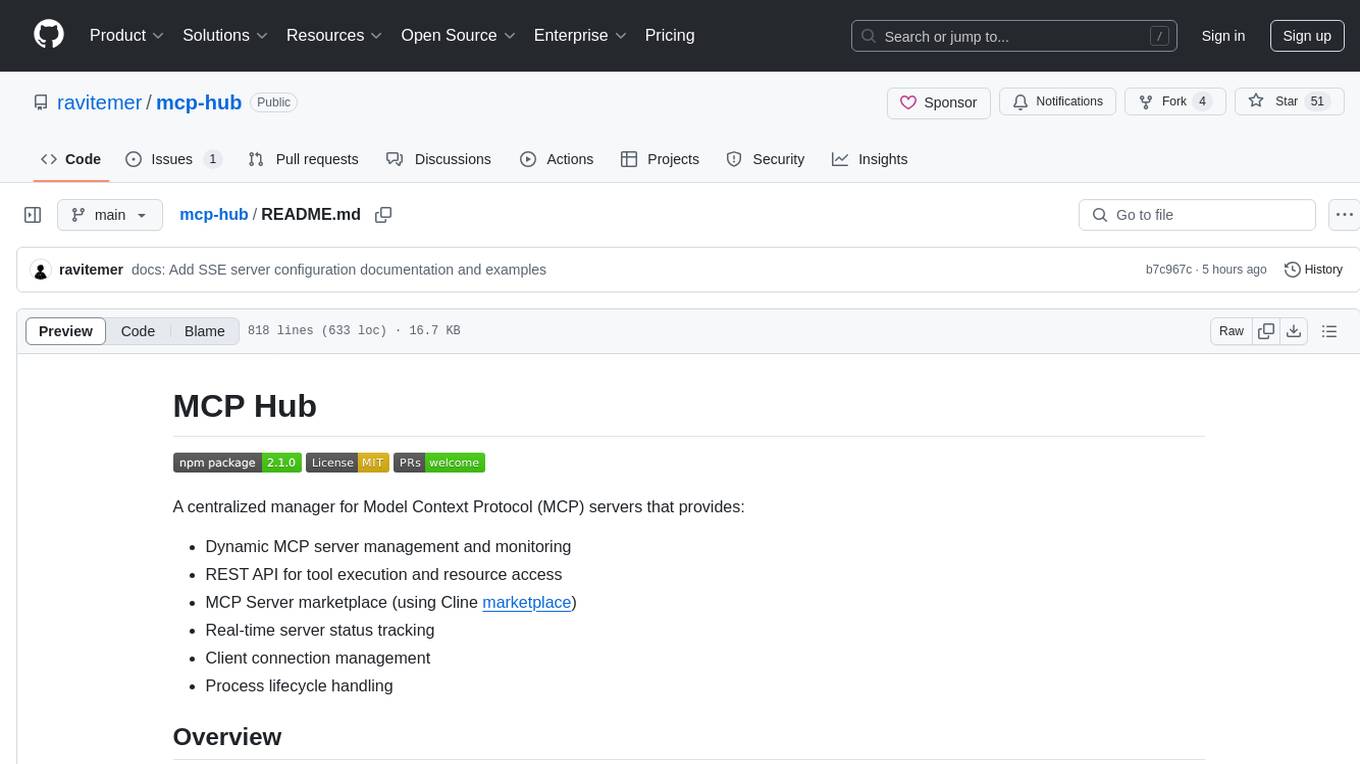
mcp-hub
MCP Hub is a centralized manager for Model Context Protocol (MCP) servers, offering dynamic server management and monitoring, REST API for tool execution and resource access, MCP Server marketplace integration, real-time server status tracking, client connection management, and process lifecycle handling. It acts as a central management server connecting to and managing multiple MCP servers, providing unified API endpoints for client access, handling server lifecycle and health monitoring, and routing requests between clients and MCP servers.
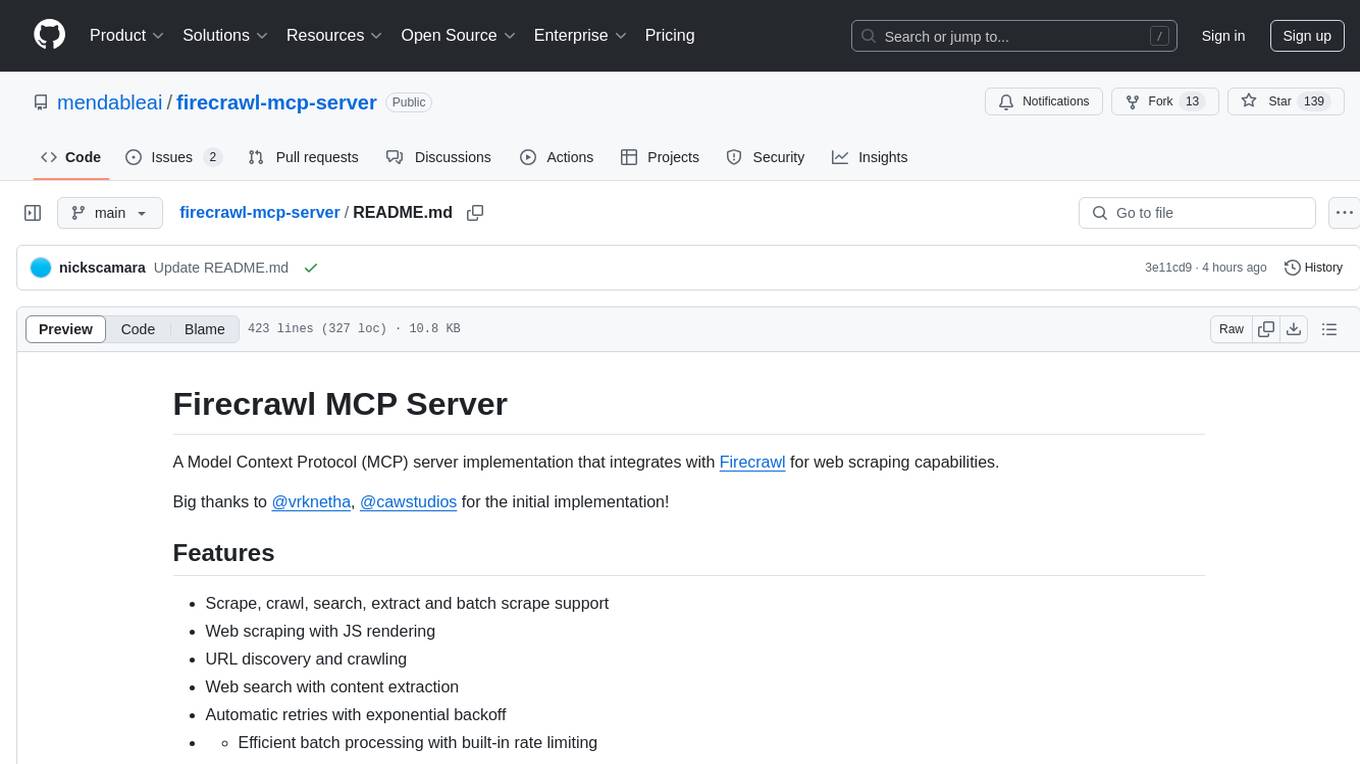
firecrawl-mcp-server
Firecrawl MCP Server is a Model Context Protocol (MCP) server implementation that integrates with Firecrawl for web scraping capabilities. It supports features like scrape, crawl, search, extract, and batch scrape. It provides web scraping with JS rendering, URL discovery, web search with content extraction, automatic retries with exponential backoff, credit usage monitoring, comprehensive logging system, support for cloud and self-hosted FireCrawl instances, mobile/desktop viewport support, and smart content filtering with tag inclusion/exclusion. The server includes configurable parameters for retry behavior and credit usage monitoring, rate limiting and batch processing capabilities, and tools for scraping, batch scraping, checking batch status, searching, crawling, and extracting structured information from web pages.
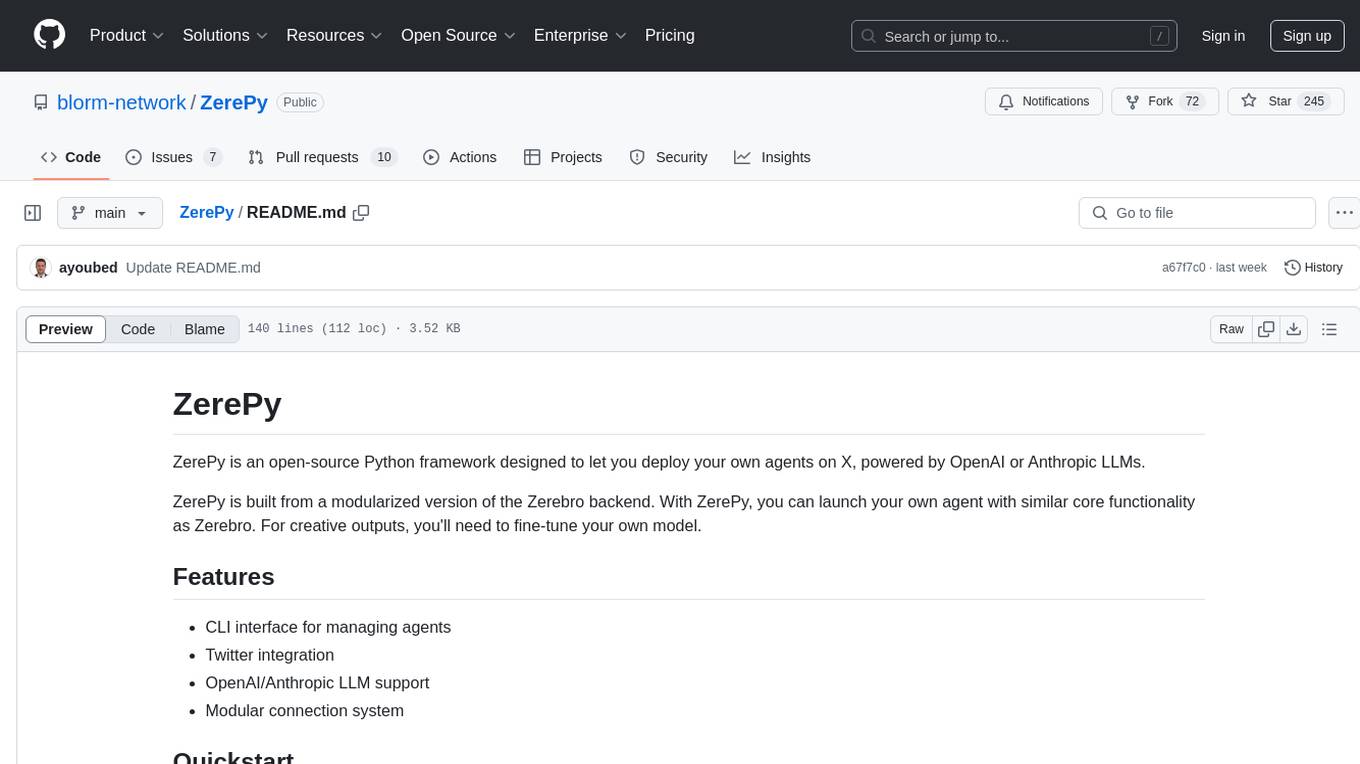
ZerePy
ZerePy is an open-source Python framework for deploying agents on X using OpenAI or Anthropic LLMs. It offers CLI interface, Twitter integration, and modular connection system. Users can fine-tune models for creative outputs and create agents with specific tasks. The tool requires Python 3.10+, Poetry 1.5+, and API keys for LLM, OpenAI, Anthropic, and X API.
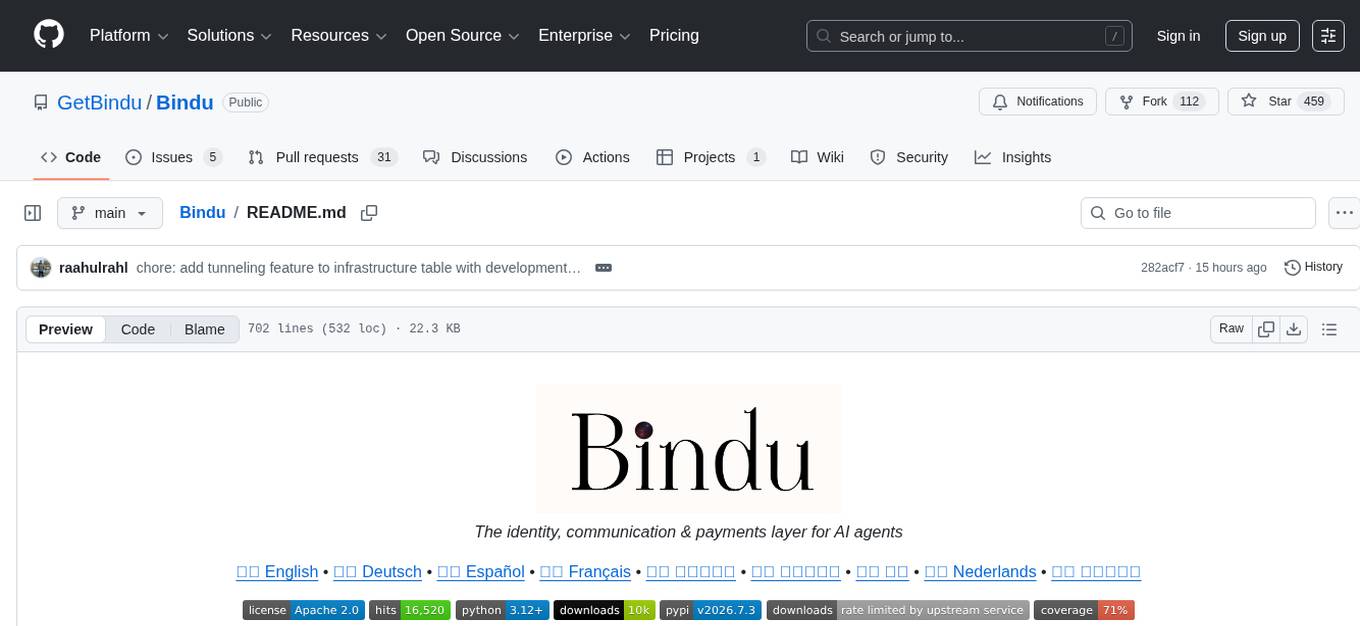
Bindu
Bindu is an operating layer for AI agents that provides identity, communication, and payment capabilities. It delivers a production-ready service with a convenient API to connect, authenticate, and orchestrate agents across distributed systems using open protocols: A2A, AP2, and X402. Built with a distributed architecture, Bindu makes it fast to develop and easy to integrate with any AI framework. Transform any agent framework into a fully interoperable service for communication, collaboration, and commerce in the Internet of Agents.
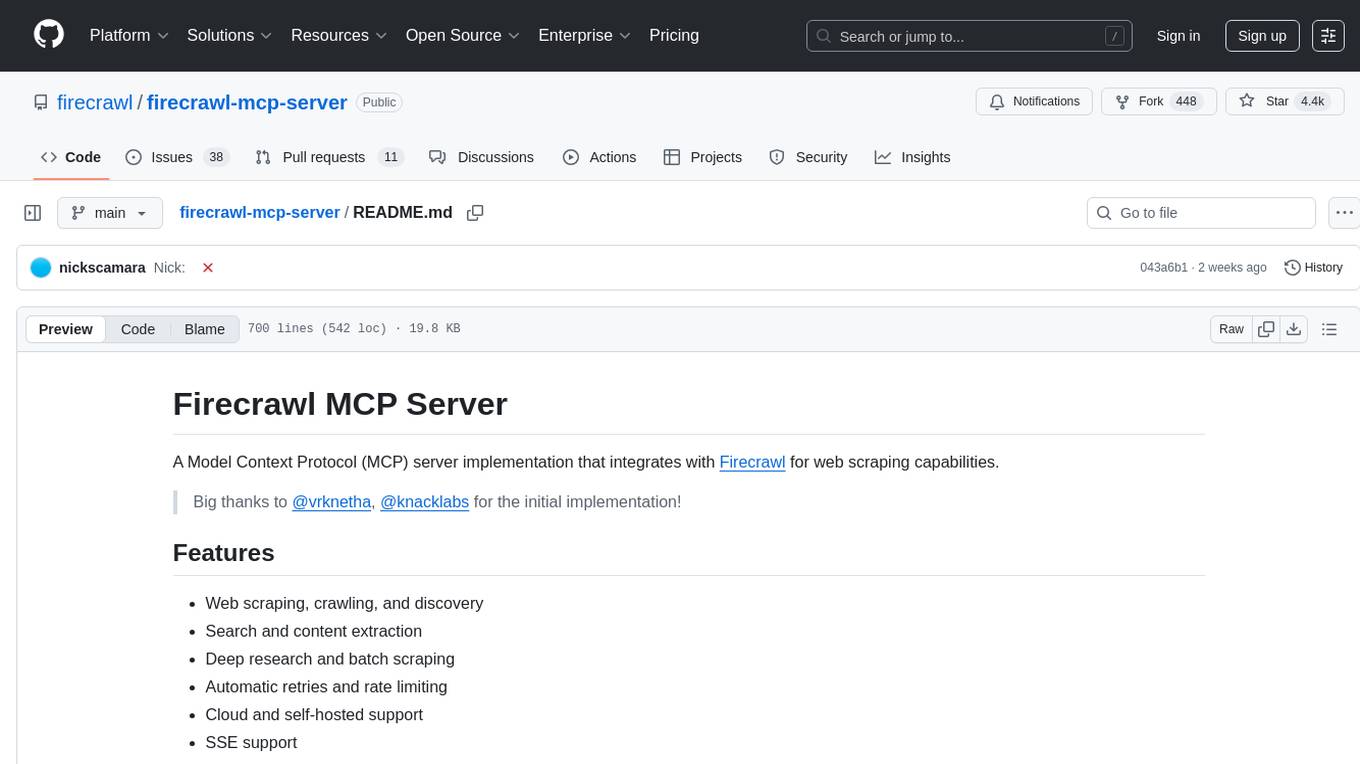
firecrawl-mcp-server
Firecrawl MCP Server is a Model Context Protocol (MCP) server implementation that integrates with Firecrawl for web scraping capabilities. It offers features such as web scraping, crawling, and discovery, search and content extraction, deep research and batch scraping, automatic retries and rate limiting, cloud and self-hosted support, and SSE support. The server can be configured to run with various tools like Cursor, Windsurf, SSE Local Mode, Smithery, and VS Code. It supports environment variables for cloud API and optional configurations for retry settings and credit usage monitoring. The server includes tools for scraping, batch scraping, mapping, searching, crawling, and extracting structured data from web pages. It provides detailed logging and error handling functionalities for robust performance.
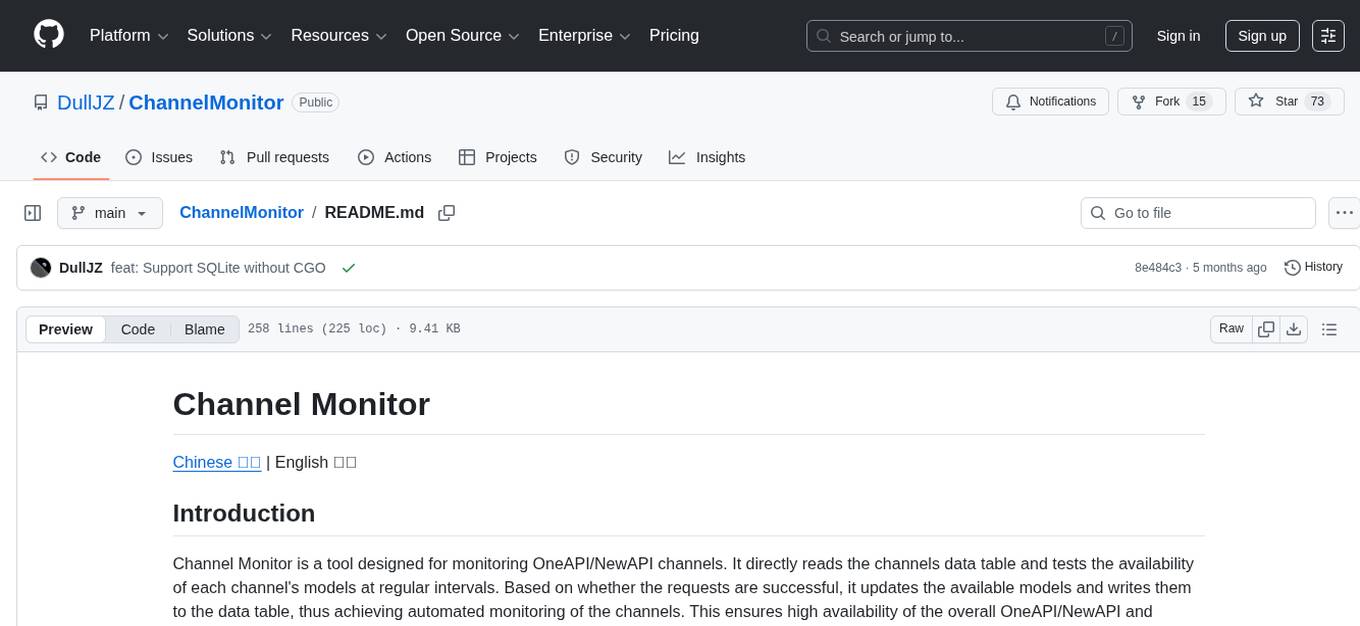
ChannelMonitor
Channel Monitor is a tool for monitoring OneAPI/NewAPI channels by testing the availability of each channel's models at regular intervals. It updates available models in the database, supports exclusion of channels and models, configurable intervals, multiple database types, concurrent testing, request rate limiting, Uptime Kuma integration, update notifications via SMTP email and Telegram Bot, and JSON/YAML configuration formats.
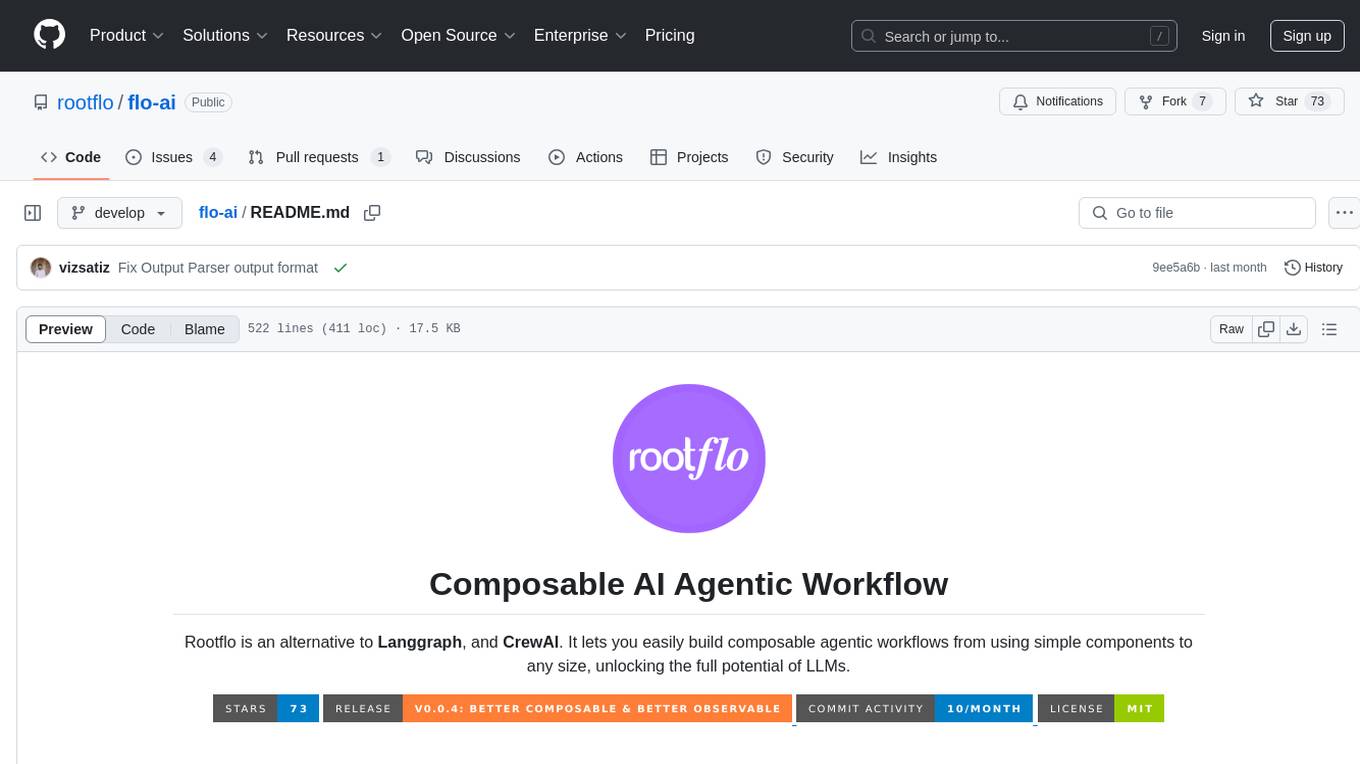
flo-ai
Flo AI is a Python framework that enables users to build production-ready AI agents and teams with minimal code. It allows users to compose complex AI architectures using pre-built components while maintaining the flexibility to create custom components. The framework supports composable, production-ready, YAML-first, and flexible AI systems. Users can easily create AI agents and teams, manage teams of AI agents working together, and utilize built-in support for Retrieval-Augmented Generation (RAG) and compatibility with Langchain tools. Flo AI also provides tools for output parsing and formatting, tool logging, data collection, and JSON output collection. It is MIT Licensed and offers detailed documentation, tutorials, and examples for AI engineers and teams to accelerate development, maintainability, scalability, and testability of AI systems.
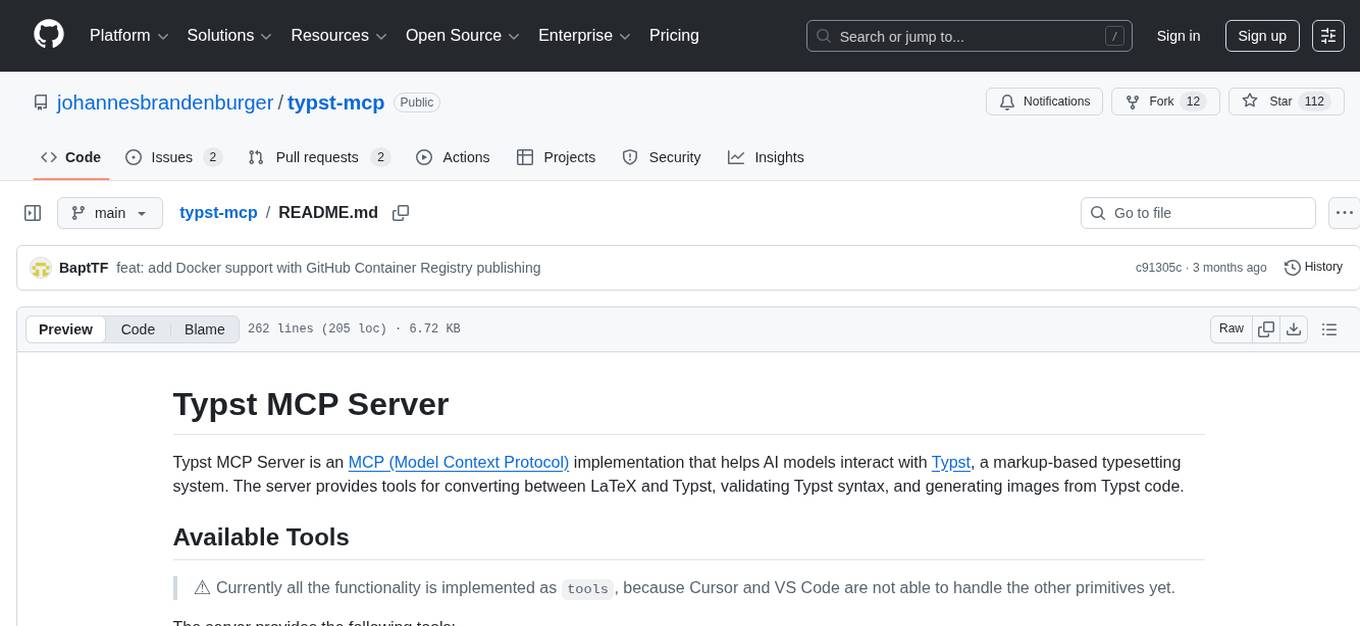
typst-mcp
Typst MCP Server is an implementation of the Model Context Protocol (MCP) that facilitates interaction between AI models and Typst, a markup-based typesetting system. The server offers tools for converting between LaTeX and Typst, validating Typst syntax, and generating images from Typst code. It provides functions such as listing documentation chapters, retrieving specific chapters, converting LaTeX snippets to Typst, validating Typst syntax, and rendering Typst code to images. The server is designed to assist Language Model Managers (LLMs) in handling Typst-related tasks efficiently and accurately.
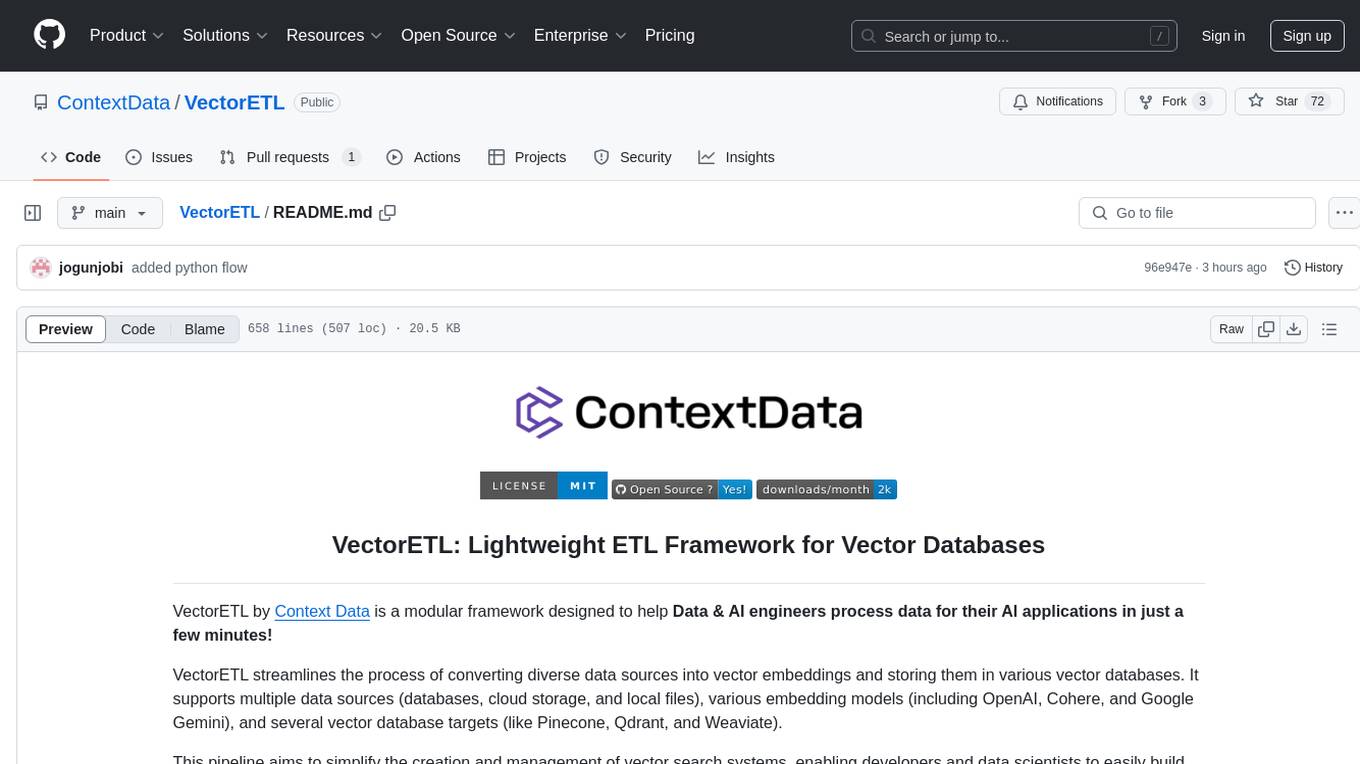
VectorETL
VectorETL is a lightweight ETL framework designed to assist Data & AI engineers in processing data for AI applications quickly. It streamlines the conversion of diverse data sources into vector embeddings and storage in various vector databases. The framework supports multiple data sources, embedding models, and vector database targets, simplifying the creation and management of vector search systems for semantic search, recommendation systems, and other vector-based operations.
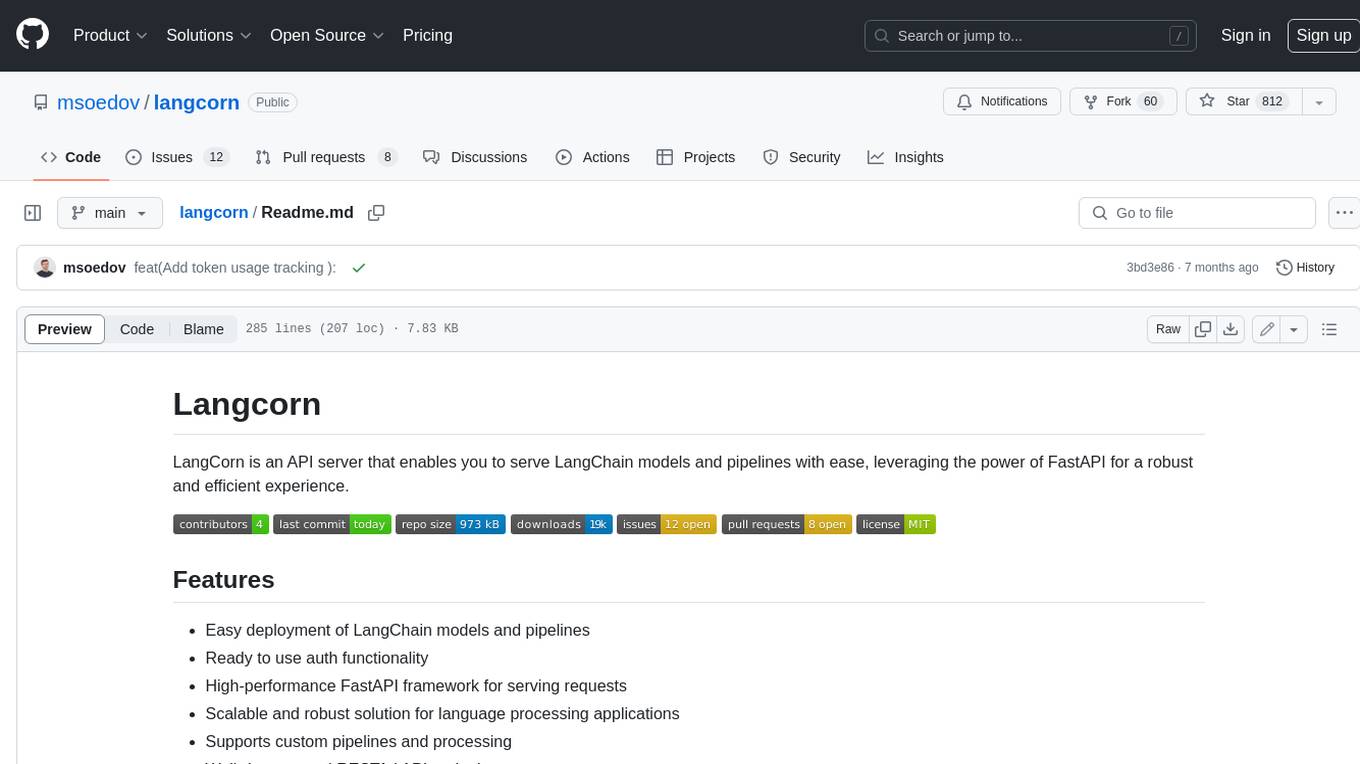
langcorn
LangCorn is an API server that enables you to serve LangChain models and pipelines with ease, leveraging the power of FastAPI for a robust and efficient experience. It offers features such as easy deployment of LangChain models and pipelines, ready-to-use authentication functionality, high-performance FastAPI framework for serving requests, scalability and robustness for language processing applications, support for custom pipelines and processing, well-documented RESTful API endpoints, and asynchronous processing for faster response times.
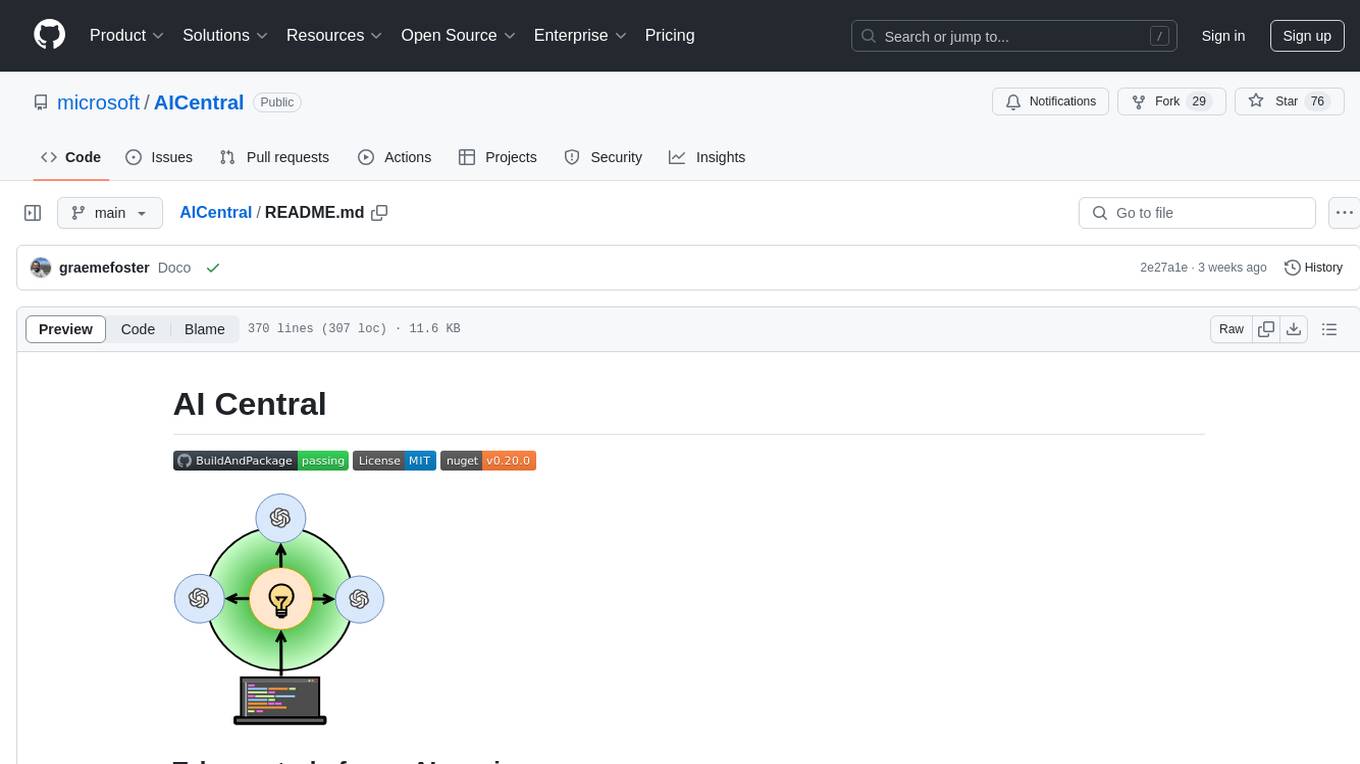
AICentral
AI Central is a powerful tool designed to take control of your AI services with minimal overhead. It is built on Asp.Net Core and dotnet 8, offering fast web-server performance. The tool enables advanced Azure APIm scenarios, PII stripping logging to Cosmos DB, token metrics through Open Telemetry, and intelligent routing features. AI Central supports various endpoint selection strategies, proxying asynchronous requests, custom OAuth2 authorization, circuit breakers, rate limiting, and extensibility through plugins. It provides an extensibility model for easy plugin development and offers enriched telemetry and logging capabilities for monitoring and insights.
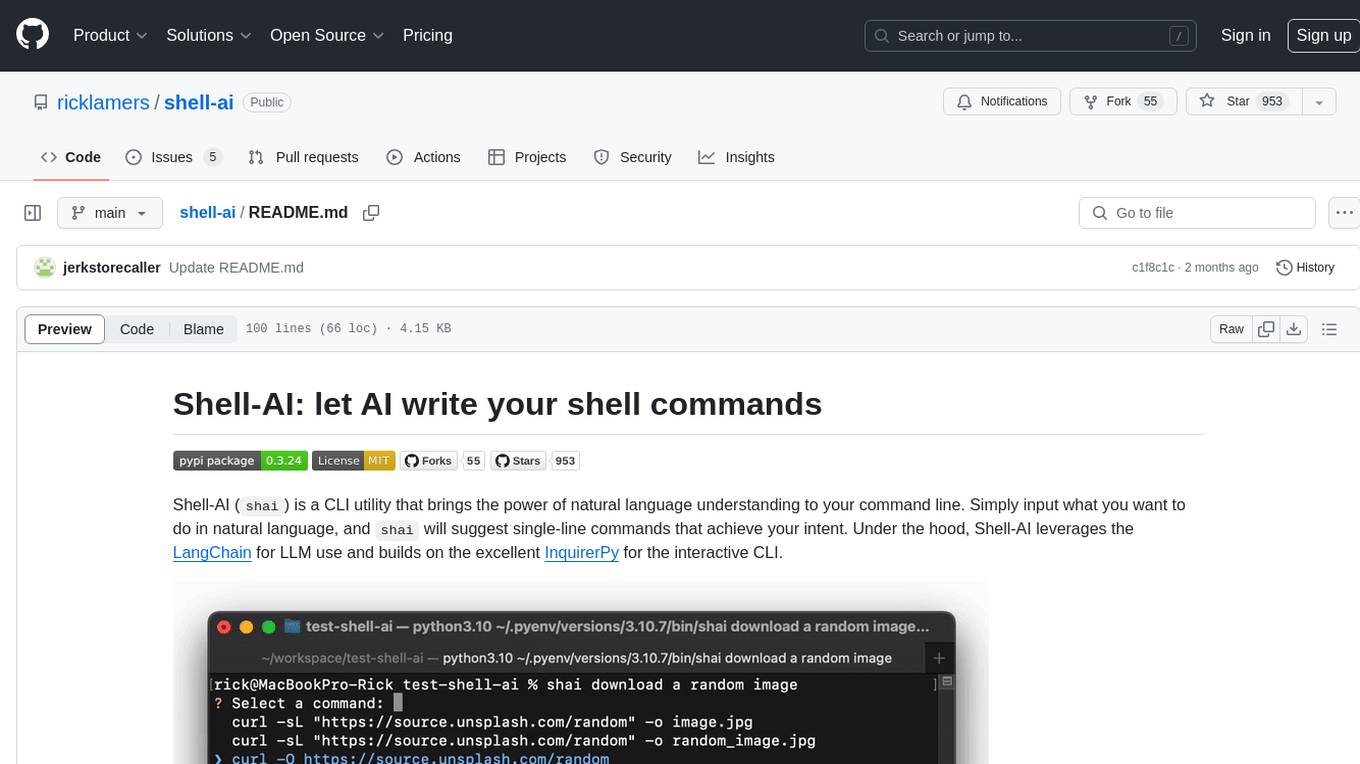
shell-ai
Shell-AI (`shai`) is a CLI utility that enables users to input commands in natural language and receive single-line command suggestions. It leverages natural language understanding and interactive CLI tools to enhance command line interactions. Users can describe tasks in plain English and receive corresponding command suggestions, making it easier to execute commands efficiently. Shell-AI supports cross-platform usage and is compatible with Azure OpenAI deployments, offering a user-friendly and efficient way to interact with the command line.
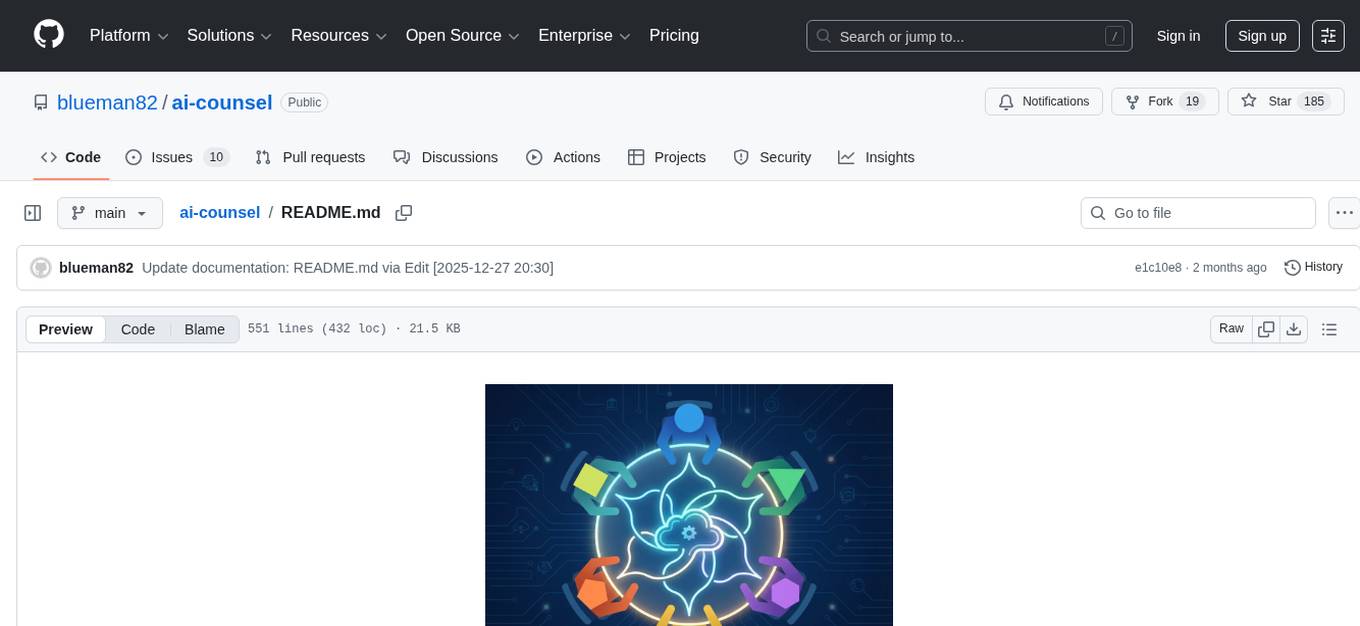
ai-counsel
AI Counsel is a true deliberative consensus MCP server where AI models engage in actual debate, refine positions across multiple rounds, and converge with voting and confidence levels. It features two modes (quick and conference), mixed adapters (CLI tools and HTTP services), auto-convergence, structured voting, semantic grouping, model-controlled stopping, evidence-based deliberation, local model support, data privacy, context injection, semantic search, fault tolerance, and full transcripts. Users can run local and cloud models to deliberate on various questions, ground decisions in reality by querying code and files, and query past decisions for analysis. The tool is designed for critical technical decisions requiring multi-model deliberation and consensus building.
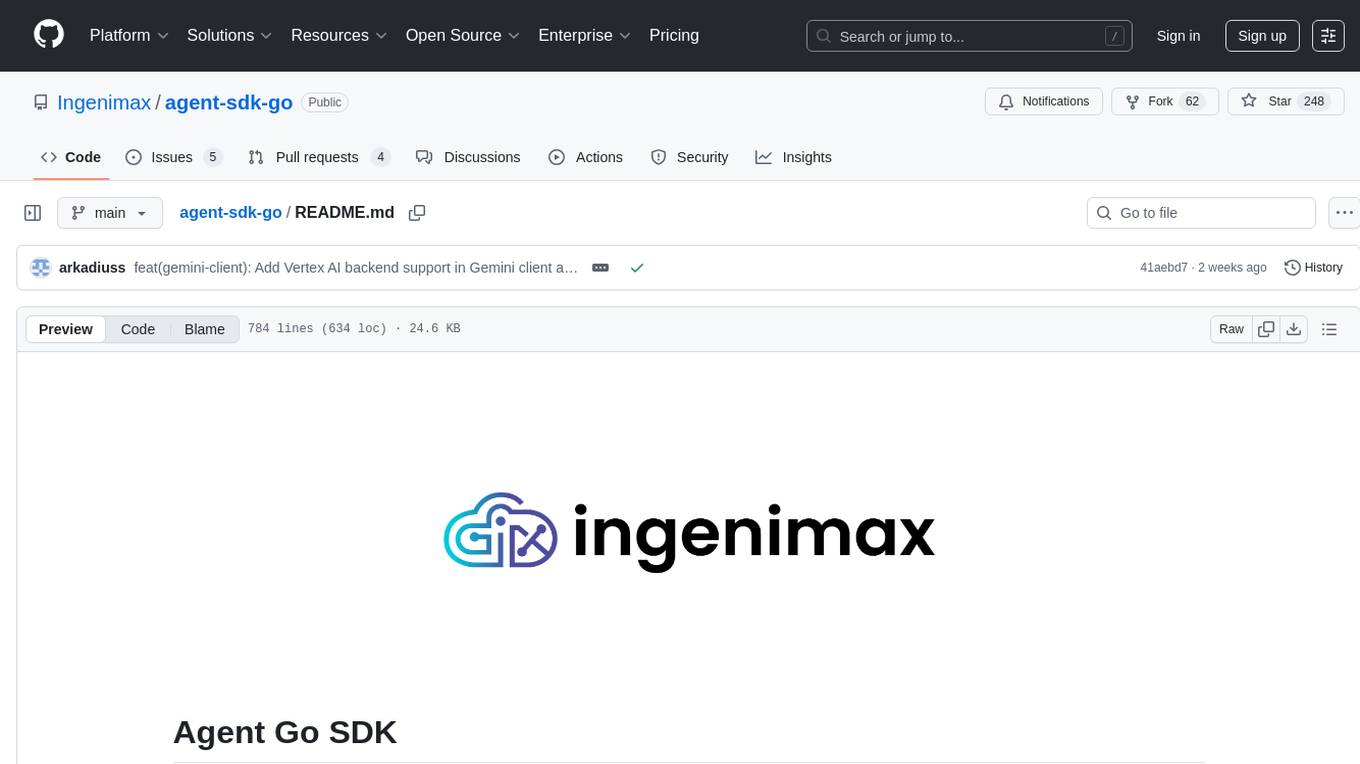
agent-sdk-go
Agent Go SDK is a powerful Go framework for building production-ready AI agents that seamlessly integrates memory management, tool execution, multi-LLM support, and enterprise features into a flexible, extensible architecture. It offers core capabilities like multi-model intelligence, modular tool ecosystem, advanced memory management, and MCP integration. The SDK is enterprise-ready with built-in guardrails, complete observability, and support for enterprise multi-tenancy. It provides a structured task framework, declarative configuration, and zero-effort bootstrapping for development experience. The SDK supports environment variables for configuration and includes features like creating agents with YAML configuration, auto-generating agent configurations, using MCP servers with an agent, and CLI tool for headless usage.
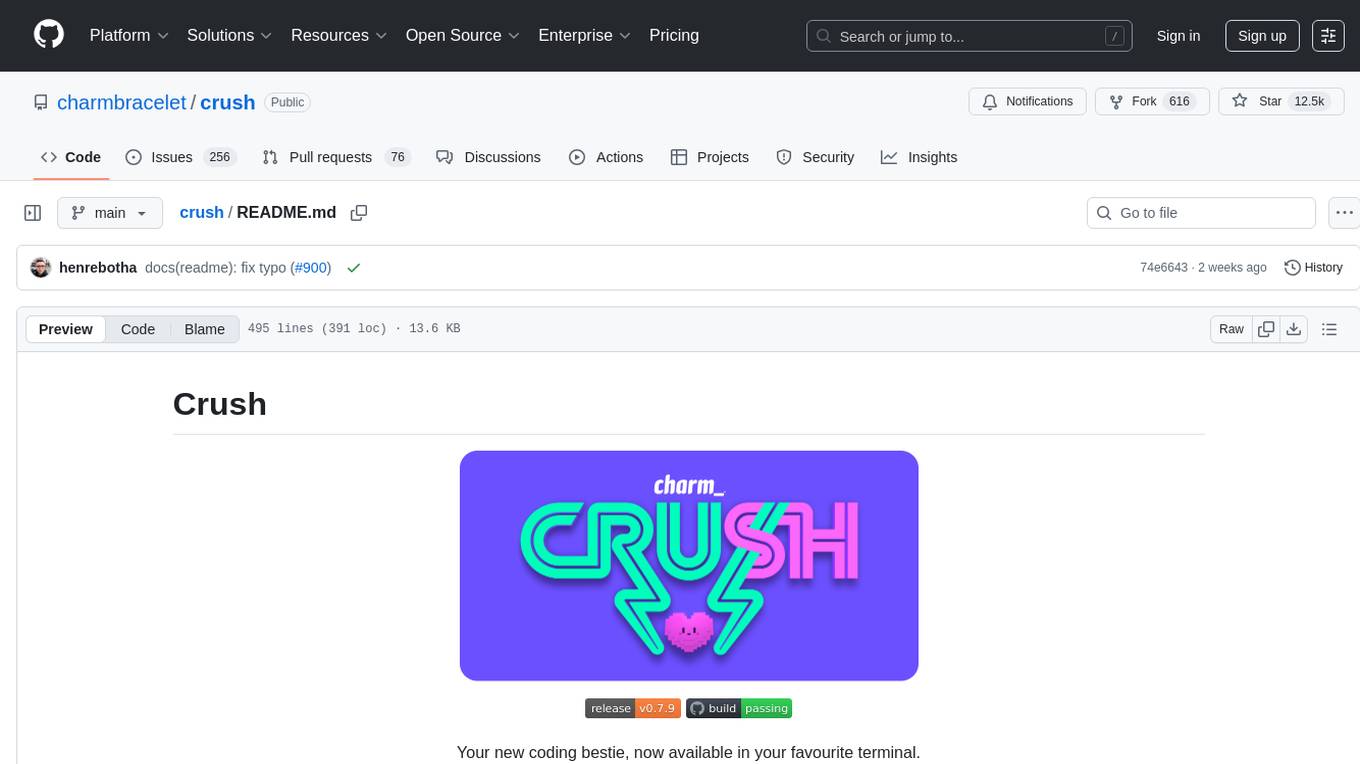
crush
Crush is a versatile tool designed to enhance coding workflows in your terminal. It offers support for multiple LLMs, allows for flexible switching between models, and enables session-based work management. Crush is extensible through MCPs and works across various operating systems. It can be installed using package managers like Homebrew and NPM, or downloaded directly. Crush supports various APIs like Anthropic, OpenAI, Groq, and Google Gemini, and allows for customization through environment variables. The tool can be configured locally or globally, and supports LSPs for additional context. Crush also provides options for ignoring files, allowing tools, and configuring local models. It respects `.gitignore` files and offers logging capabilities for troubleshooting and debugging.
For similar tasks

beelzebub
Beelzebub is an advanced honeypot framework designed to provide a highly secure environment for detecting and analyzing cyber attacks. It offers a low code approach for easy implementation and utilizes virtualization techniques powered by OpenAI Generative Pre-trained Transformer. Key features include OpenAI Generative Pre-trained Transformer acting as Linux virtualization, SSH Honeypot, HTTP Honeypot, TCP Honeypot, Prometheus openmetrics integration, Docker integration, RabbitMQ integration, and kubernetes support. Beelzebub allows easy configuration for different services and ports, enabling users to create custom honeypot scenarios. The roadmap includes developing Beelzebub into a robust PaaS platform. The project welcomes contributions and encourages adherence to the Code of Conduct for a supportive and respectful community.
For similar jobs
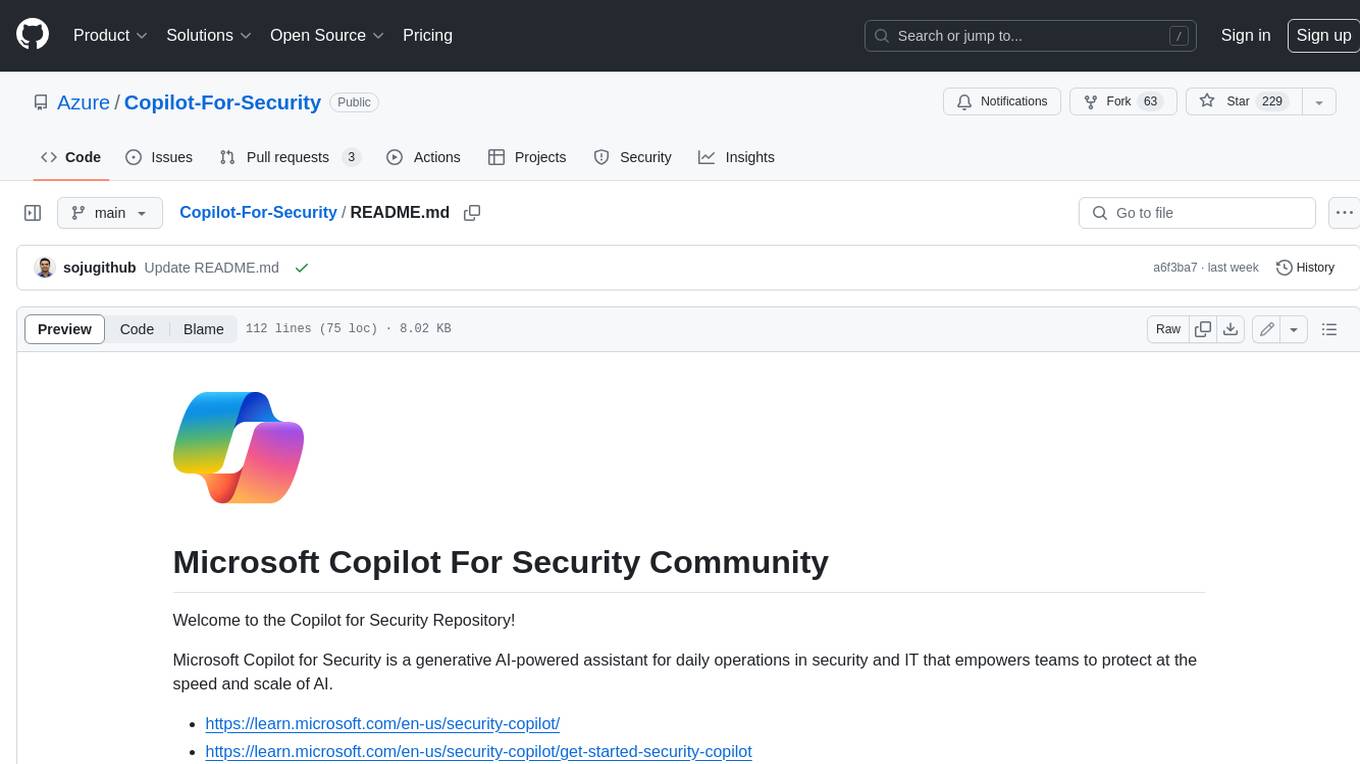
Copilot-For-Security
Microsoft Copilot for Security is a generative AI-powered assistant for daily operations in security and IT that empowers teams to protect at the speed and scale of AI.

AIL-framework
AIL framework is a modular framework to analyze potential information leaks from unstructured data sources like pastes from Pastebin or similar services or unstructured data streams. AIL framework is flexible and can be extended to support other functionalities to mine or process sensitive information (e.g. data leak prevention).

beelzebub
Beelzebub is an advanced honeypot framework designed to provide a highly secure environment for detecting and analyzing cyber attacks. It offers a low code approach for easy implementation and utilizes virtualization techniques powered by OpenAI Generative Pre-trained Transformer. Key features include OpenAI Generative Pre-trained Transformer acting as Linux virtualization, SSH Honeypot, HTTP Honeypot, TCP Honeypot, Prometheus openmetrics integration, Docker integration, RabbitMQ integration, and kubernetes support. Beelzebub allows easy configuration for different services and ports, enabling users to create custom honeypot scenarios. The roadmap includes developing Beelzebub into a robust PaaS platform. The project welcomes contributions and encourages adherence to the Code of Conduct for a supportive and respectful community.
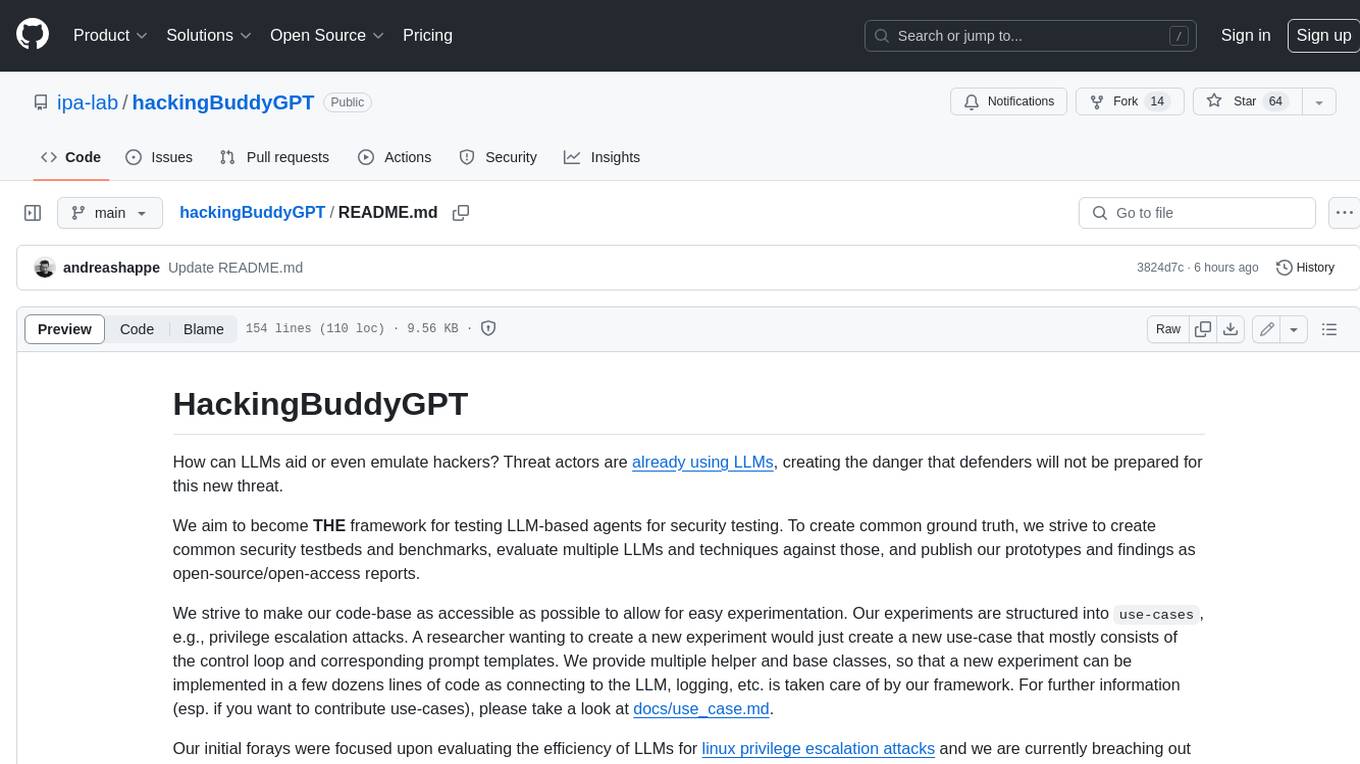
hackingBuddyGPT
hackingBuddyGPT is a framework for testing LLM-based agents for security testing. It aims to create common ground truth by creating common security testbeds and benchmarks, evaluating multiple LLMs and techniques against those, and publishing prototypes and findings as open-source/open-access reports. The initial focus is on evaluating the efficiency of LLMs for Linux privilege escalation attacks, but the framework is being expanded to evaluate the use of LLMs for web penetration-testing and web API testing. hackingBuddyGPT is released as open-source to level the playing field for blue teams against APTs that have access to more sophisticated resources.
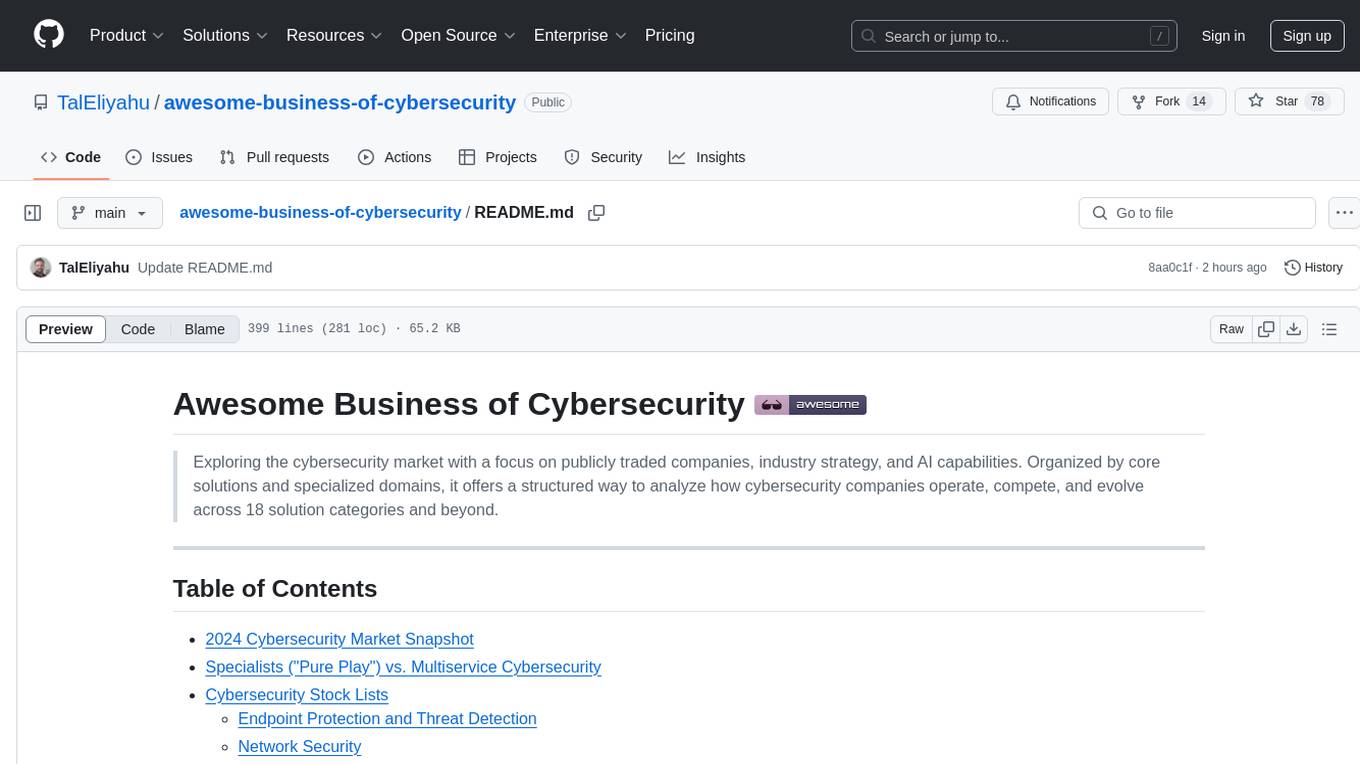
awesome-business-of-cybersecurity
The 'Awesome Business of Cybersecurity' repository is a comprehensive resource exploring the cybersecurity market, focusing on publicly traded companies, industry strategy, and AI capabilities. It provides insights into how cybersecurity companies operate, compete, and evolve across 18 solution categories and beyond. The repository offers structured information on the cybersecurity market snapshot, specialists vs. multiservice cybersecurity companies, cybersecurity stock lists, endpoint protection and threat detection, network security, identity and access management, cloud and application security, data protection and governance, security analytics and threat intelligence, non-US traded cybersecurity companies, cybersecurity ETFs, blogs and newsletters, podcasts, market insights and research, and cybersecurity solutions categories.
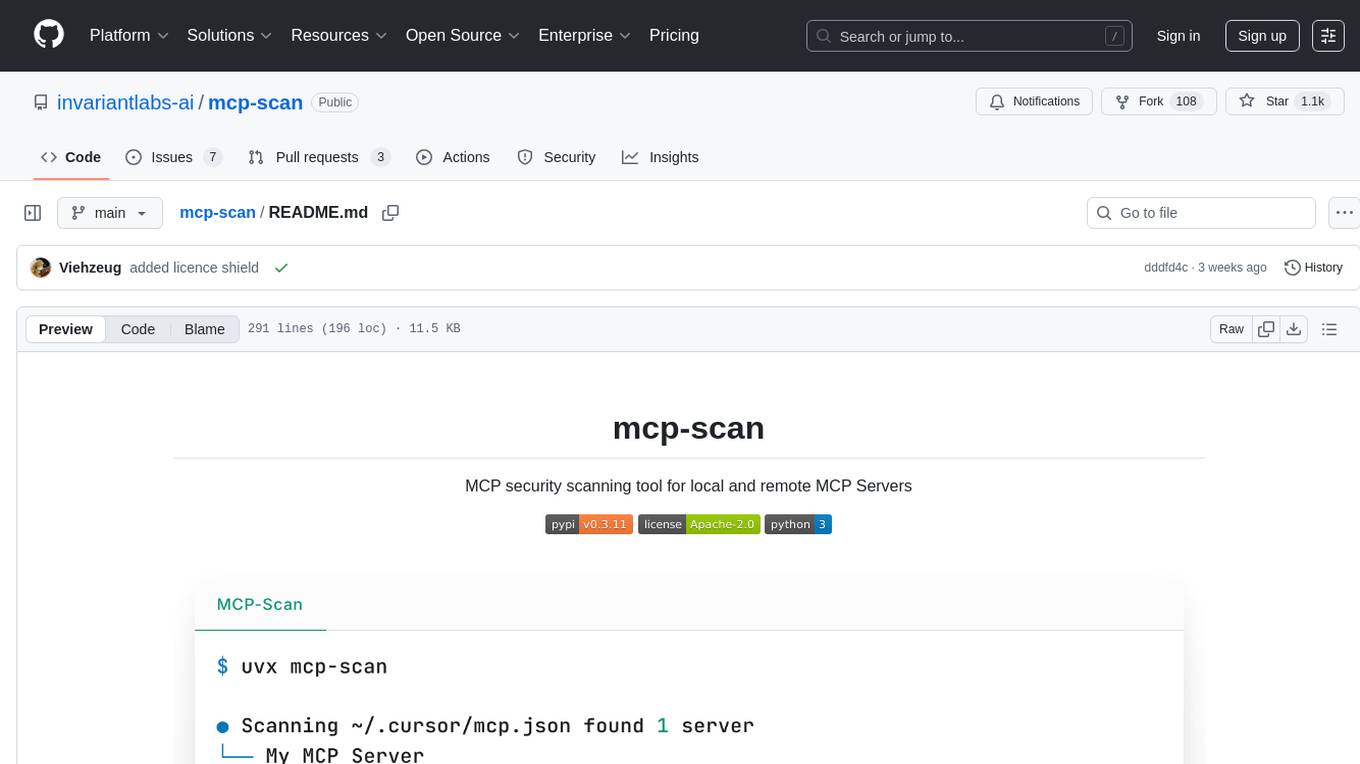
mcp-scan
MCP-Scan is a security scanning tool designed to detect common security vulnerabilities in Model Context Protocol (MCP) servers. It can auto-discover various MCP configurations, scan both local and remote servers for security issues like prompt injection attacks, tool poisoning attacks, and toxic flows. The tool operates in two main modes - 'scan' for static scanning of installed servers and 'proxy' for real-time monitoring and guardrailing of MCP connections. It offers features like scanning for specific attacks, enforcing guardrailing policies, auditing MCP traffic, and detecting changes to MCP tools. MCP-Scan does not store or log usage data and can be used to enhance the security of MCP environments.
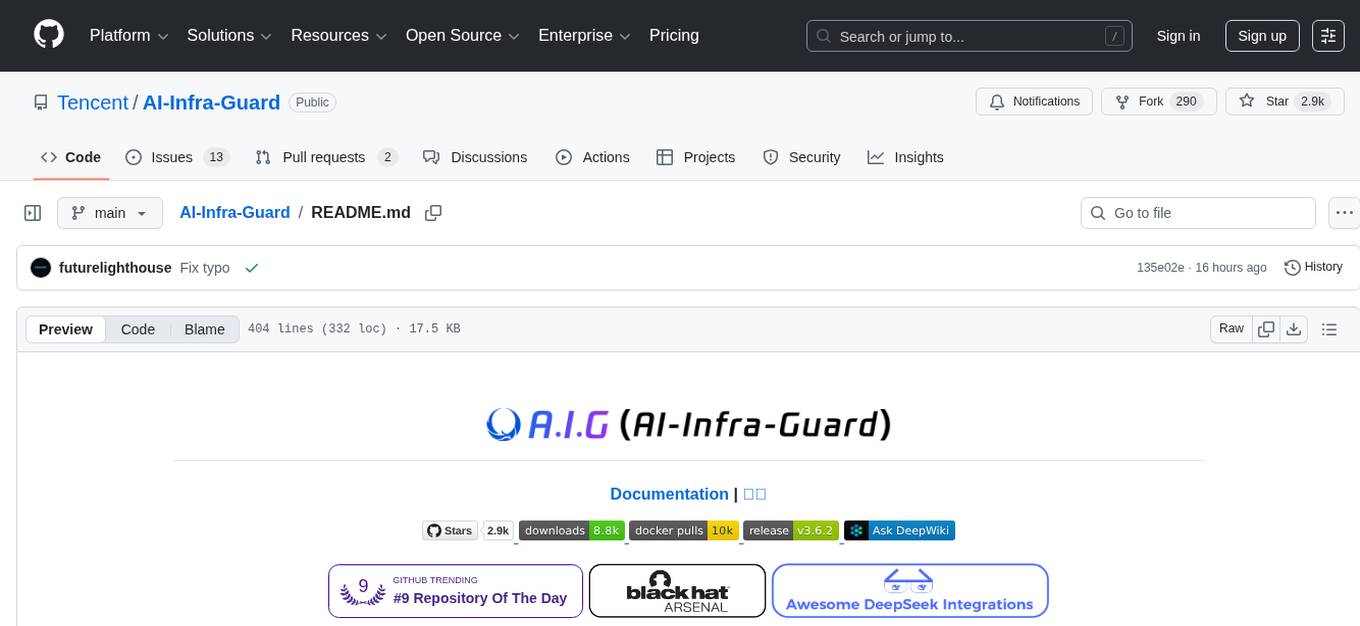
AI-Infra-Guard
A.I.G (AI-Infra-Guard) is an AI red teaming platform by Tencent Zhuque Lab that integrates capabilities such as AI infra vulnerability scan, MCP Server risk scan, and Jailbreak Evaluation. It aims to provide users with a comprehensive, intelligent, and user-friendly solution for AI security risk self-examination. The platform offers features like AI Infra Scan, AI Tool Protocol Scan, and Jailbreak Evaluation, along with a modern web interface, complete API, multi-language support, cross-platform deployment, and being free and open-source under the MIT license.
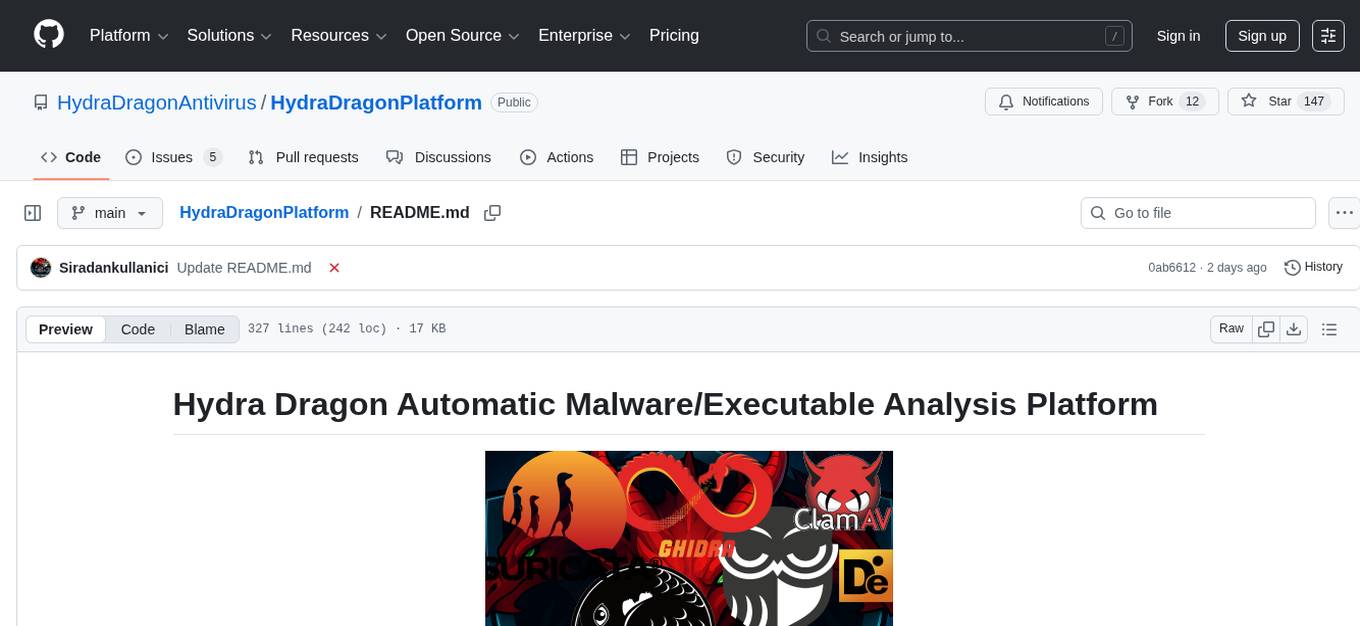
HydraDragonPlatform
Hydra Dragon Automatic Malware/Executable Analysis Platform offers dynamic and static analysis for Windows, including open-source XDR projects, ClamAV, YARA-X, machine learning AI, behavioral analysis, Unpacker, Deobfuscator, Decompiler, website signatures, Ghidra, Suricata, Sigma, Kernel based protection, and more. It is a Unified Executable Analysis & Detection Framework.

